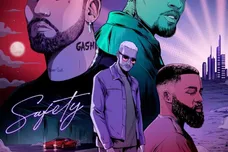In the past year, Willie Maxwell, best known to the world as the one-eyed rapper Fetty Wap, has had one of the most monumental rises in rap in the past few years. Despite being a relative newcomer, the Patterson, NJ-based rapper's debut single "Trap Queen" has become a phenomenal smash hit, the kind that most rappers don't achieve in the ever-segmented radio of the 21st century. Any chance of dismissal with the title of 'one-hit wonder' were swiftly torpedoed by how easily follow-up singles like "My Way" and "679" helped extend his brand into the stratosphere. The usual Drake and Kanye co-signs were predictable but nonetheless encouraging, and now after such an overwhelming year, Fetty Wap's debut album has been released to help bring his fantastic 2015 to a dramatic close.
Before getting into the album itself, a lot of unfortunate mislabeling has managed to pollute the dialog around Fetty Wap's actual skills as a rapper. Since his singles contain a considerable amount of singing from Fetty, more than a few conservative rap writers have taken upon themselves to opine that he's really some sort of R&B singer who just happens to write songs for a rap audience. Others too, when complimenting how earnest and exciting "Trap Queen" sounds will always derail the conversation to take the time to point out how the rapped-second verse doesn't meet the standards set by the rest of the song. None of these remarkable observations get launched at other rappers who rely upon melody and sing-song flows such as Rich Homie Quan, Young Thug, Chief Keef or Future (the latter being an often-cited influence for Fetty), who happen to be the obvious contemporaries for the style of rap that Fetty is making. The fact is, even when he's singing Fetty is clearly rapping, but in a way that defies the expectations of people who've resigned themselves to the idea that rapping and singing are somehow completely removed from one another. In a way, he's also a throwback to rappers like Nelly, Max B or Ja Rule who also thrived by blurring the lines of pop and rap not so long ago.
To focus back on Fetty's skillset, he's admittedly not going to perform any 'lyrical miracles' and blow your mind. Fetty Wap is a street-rapper through and through, so content is strictly derived to getting money and being ready to laugh at his haters, when not concerned with being America's heart throb. Flow-wise he typically sticks to maneuvers that have come out of the playbooks of Gucci Mane, Keef and Future; but unlike them, he isn't nearly as full of bizarre content, nor does he take the radical chances that can have you wondering if the lean was spiked with something else. To seemingly make up for how light and fluffy his verses are, he supports himself with verses from his fellow Remy Boy, Monty. No doubt, Monty has to be the crudest rapper-turned-sidekick since Coke Wave-era French Montana, but his to-the-point simplicity gives the wild vocals of Fetty an excellent foil to compliment the tracks. Also not sure if the inclusion of Drake-a-like M80 is meant to distract from the absence of the Drake feature many of us have become used to hearing (or skipping).
Most importantly, this is a hook-driven album and that is definitely where Fetty shines. It doesn't matter if its the goofy bounce to "Juug" or the gravely, sinister edge he manages to squeeze out of "I Wonder" that seem like the antithesis of Fetty's new-found image and harken back to mixtape joints like his laconic "Gucci Zoo." Production and vocals here are the key, and thankfully Fetty has kept around frequent collaborators Yung Lan and Peoples to handle the bulk of his album. For the most part, there's a somewhat generic trap or (admittedly) R&B leaning-feel to most of the beats, but their stripped quality works well for Fetty to drive a majority of the song. Missteps occurred, such as former Soundcloud favorite "Rewind" getting its beat remixed into a generic Drake-style slow-jam, or the way "Again" seems so devoid of new ideas and overstretched in length, that Fetty actually makes the bizarre decision to rap the chorus of "Trap Queen" as a verse. But with the more melodramatic records like "Couple Bands" or the unofficial fan favorite "RGF Island," our hero really shines and seems even more comfortable.
Regardless of how the album sells, Fetty Wap has already established that he won't be vanishing any time soon after providing the world with such monster singles. Very little changes in his approach on the album, so it's unlikely Fetty Wap will convert any of the nonbelievers or those who failed to 'get' him regardless of how much they enjoy his hits. The slimness of his album doesn't do him in any favors in that regard-- it's all familiar territory, one a fan might love to tread over again, however a would-be-fan, not so much. One can't imagine his fans are feeling any sort of disappointment for the album then, but will it help Fetty's quest for super-stardom in the longterm?









